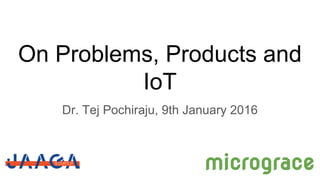On Problems, Products and IoT by Tej | CuTech Talks
- 1. On Problems, Products and IoT Dr. Tej Pochiraju, 9th January 2016 micrograce
- 2. Brief Bio ŌŚÅ Wireless hardware + applications since 2004 ŌŚÅ >150 SMEs + some LEs (Cadbury, Texon, Rockwool) ŌŚÅ ~40 product developments ŌŚŗ Some successes, many failures ŌŚŗ Livestock RFID (Scotland/France) ŌŚŗ Wave energy sensor network (currently off coast of NY) ŌŚŗ Passive RFID Pressure Sensor (England) ŌŚŗ Wireless Smart Grid Sensors (Italy) ŌŚŗ Wireless Tyre Pressure Sensor (Northern Ireland) ŌŚŗ Trailer Monitoring (sold to Ministry of Defence, UK) ŌŚŗ Very, very keen to work on environmental challenges in India
- 3. Ignore your idea Definitely ignore your technology Focus on the problem
- 4. Problem Driven Approach to Product Development ŌŚÅ What is the problem? ŌŚÅ Who is affected by this problem? ŌŚÅ Why is this problem worth solving? aka Return on Investment ŌŚÅ When is the problem worth solving? ŌŚÅ When will the solution be commoditised? Can you wait? ŌŚÅ Who is willing to pay for the solution? ŌŚÅ Is it a product?
- 5. Remote Monitoring of Wave Energy Generators
- 6. Remote Monitoring of Wave Energy Generators ŌŚÅ NEED: Generator can be damaged if not shut down during strong waves resulting in loss of ~$1M to equipment owner ŌŚÅ Idea: Remotely monitor waves and automatically shut generator down during ŌĆśeventsŌĆÖ ŌŚÅ Technology: Wave sensors in wireless mesh network for remote monitoring from up to 12 km ŌŚÅ ROI: Sensor Deployment costs about $300,000 and lasts 10+ years [Think Insurance]
- 7. Remote Monitoring of Electric Grid: Similar Story
- 11. Touchscreen Sphygmomanometer in 2007!
- 12. What is IoT? ŌŚÅ Really old concept ŌŚÅ Overused phrase ŌŚÅ Lots of data but NOT Big Data ŌŚŗ Most processes being measured are well understood physically or need relatively simple statistical models ŌŚŗ Big Data Analytics are great at understanding stochastic/random processes ŌŚÅ Quite useful, in the right context
- 13. What is IoT good for? ŌŚÅ Consumer goods - extremely difficult to predict (+ no personal experience) ŌŚÅ Industrial: ŌŚŗ Where cost of failure is high Ō¢Ā Asset tracking, predictive maintenance ŌŚŗ Where process is not completely understood or influenced by uncontrolled parameters Ō¢Ā Agriculture Ō¢Ā Chocolate/Alcohol making (havenŌĆÖt changed for 100+ years!) Ō¢Ā But beware questions on ROI and who pays! ŌŚŗ Where there is an advantage to aggregating data from multiple installations Ō¢Ā Aircrafts (practising data sharing for 60+ years) Ō¢Ā Traffic monitoring
- 14. What I have learnt ŌŚÅ The best technology is one that solves the problem effectively and will solve it for the lifetime of deployment ŌŚÅ Lifetime determined by first component to fail expensively: ŌŚŗ Sensor ŌŚŗ Data logger ŌŚŗ Communications network (what if 2G disappears?) ŌŚÅ The best way to develop hardware is by eliminating as much hardware as possible ŌŚÅ If you can implement something in software (and cloud), DO IT! ŌŚŗ Total Harmonic Distortion calculation on cloud vs in hardware
- 15. Common Startup Failures ŌŚÅ Not understanding/picking the right problem ŌŚŗ Secondary research is not good enough. Get out there and research the problem ŌŚÅ Solving everything ŌŚŗ Solve one problem really well Ō¢Ā Kickass cloud db+viz+analytics >> ŌĆśFull-stackŌĆÖ data logger+cloud :-( ŌŚÅ Lack of Focus ŌŚŗ Pick a problem that is worth solving, solve it, sell it ŌŚŗ Do nothing else until 1st sale then whore yourself to investors to scale ŌŚŗ Set a time limit on when to stop (12-18 months) ŌŚÅ Reinventing the wheel ŌŚŗ Use open source, use proprietary, use what exists if it meets your needs ŌŚŗ Replace when worth replacing (almost never will be)
- 16. Ignore your idea Definitely ignore your technology Focus on the problem






![Remote Monitoring of Wave Energy Generators
ŌŚÅ NEED: Generator can be damaged if not shut down during strong waves
resulting in loss of ~$1M to equipment owner
ŌŚÅ Idea: Remotely monitor waves and automatically shut generator down
during ŌĆśeventsŌĆÖ
ŌŚÅ Technology: Wave sensors in wireless mesh network for remote
monitoring from up to 12 km
ŌŚÅ ROI: Sensor Deployment costs about $300,000 and lasts 10+ years [Think
Insurance]](https://image.slidesharecdn.com/onproblemsproductsandiotbytej-cutechtalks-160111071459/85/On-Problems-Products-and-IoT-by-Tej-CuTech-Talks-6-320.jpg)









